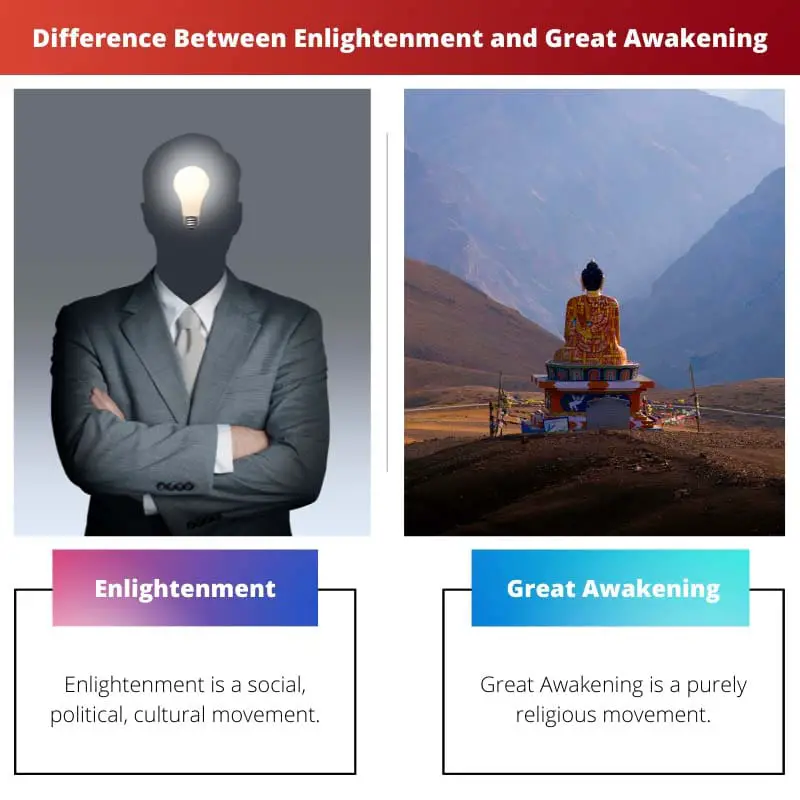The awakening of minds has been in the limelight for ages. The majority of the European and American colonies have practised this. Awakening minds made them realise that they had the potential to rule and lead themselves.
Not only politically but religiously too. The revolutions that took place changed their mindsets on a particular surviving society and their mother country.
The movements that took place enlightened the citizens of Europe and America. They realised that they could survive without depending upon their countries.
Although the Great Awakening and Enlightenment seem similar, there are differences between them as well. In this article, we will discuss the major differences between the two terms, enlightenment and great awakening.
Key Takeaways
- The Enlightenment was a philosophical movement in the 18th century that emphasized reason, science, and individual rights. At the same time, the Great Awakening was a religious revival movement in the 18th century that emphasized emotional and personal experiences with God.
- The Enlightenment challenged traditional authority and institutions, while the Great Awakening emphasized the importance of faith and religious leader.
- The Enlightenment influenced the development of democratic ideals and scientific progress, while the Great Awakening had a lasting impact on American Christianity and its influence on American culture.
Enlightenment vs Great Awakening
Enlightenment is associated with political, economic, and cultural rights, mostly in North America and Europe. Whereas, the Great Awakening came into existence in American colonies at the beginning of the mid-seventeenth century, giving people religious freedoms. Enlightenment’s main target was to replace superstitions and blind faith with the power of science and reasoning. However, the latter focused on new religious views.

Enlightenment is a type of revolution which is concerned with social, political, economic and cultural characteristics. This movement began in the 17th and 18th centuries.
The rebels, movements and revolutions of Enlightenment took place in North America and some parts of Europe as well. At the concerned places, the citizens acquired political freedoms. The key figures associated with this revolution are Issac Newton and John Locke.
Great Awakening is mainly, solely and only concerned with religious views. The revolution of the Great Awakening began for the first time between the 1730s and 1740s. The Great Awakening occurred in colonies of the USA or America.
Its main target was the emergence of new religious views. The citizens of Europe acquired religious freedoms due to the Great Awakening. The key figures associated with the Great Awakening are Jonathan Edwards, Gilbert & William Tennent, the Wesley Brothers and George Whitefield.
Comparison Table
| Parameters of Comparison | Enlightenment | Great Awakening |
|---|---|---|
| Nature | Enlightenment is a social, political, cultural movement. | Great Awakening is a purely religious movement. |
| Period of Occurrence | Enlightenment occurred in the 17th and 18th centuries. | Between the 1730s and 1740s. |
| Place of occurrence | North American and Europe | Great Awakening occurred in the colonies of America. |
| What is targeted? | It targeted replacing blind faith and superstitions with science and reasoning. | It targeted new emerging religious views. |
| Major consequence | The citizens acquired political freedoms in high number. | The citizens acquired religious freedoms. |
| Key figures | John Locke, Issac Newton | Jonathan Edwards, George Whitefield |
What is Enlightenment?
Enlightenment is sometimes also referred to as the Age of Reason. In the eighteenth century, cultural and intellectual movements began, and then the application of science and reasoning took over blind faith and superstitions.
The people who initiated Enlightenment were Voltaire, John Locke and Isaac Newton, who gave the Law of Gravity. These were the people who gave more emphasis on the origin of various processes in mankind and not the existing knowledge.
Their new ideas were based on openness, investigation and religious tolerance across Europe and North America. With the emergence of Western civilization, the era of Enlightenment began.
The majority of people saw it as a glimpse of light to sway away from the era of darkness. The Enlightenment was based on various ideas. Some of the ideas are Cosmopolitanism, Progressivism, Empiricism and Rationalism.

What is Great Awakening?
The Great Awakening was a type of religious revolution. It was started in Europe and basically in England in the late 1720s. This movement was later spread to different colonies of America during the 1730s.
Over three consecutive decades, Gilbert and William Tennent, the father and son duo, led the revolution in the affected colonies. Not all the ministers of America were swept by the age of reasoning.
The Yale minister, Jonathan Edwards, never emphasised converting the Church of England. He was more concerned for the citizens of New England getting involved with the pursuit of wealth, wordy matters and the religious principles and teachings of John Calvin.
It was believed that a pure soul could be saved with the help of good deeds. This kind of thing sparked the emergence of the Great Awakening.
The era of the emergence of the Great Awakening led to the creation of new institutions, such as churches and Princeton University. Some people followed the new era, whereas others refused this concept. Thus, the separation between Americans occurred.

Main Differences Between Enlightenment and Great Awakening
- Enlightenment is a type of movement which is concerned with social, political, and cultural characteristics. However, the Great Awakening is concerned with religious views.
- Enlightenment began in the seventeenth and eighteenth centuries. On the other hand, the Great Awakening happened between the 1730s and 1740s.
- The rebels and movements of Enlightenment took place in North America and Europe. On the other hand, the Great Awakening first occurred in the colonies of America.
- Enlightenment targeted at replacing superstitions and blind faith with science and reasoning. On the other hand, the Great Awakening targeted new emerging religious views.
- In the case of the Enlightenment, the citizens acquired political freedoms extensively. In contrast, the citizens acquired religious freedoms in the Great Awakening.
- The key figures associated with Enlightenment are John Locke and Issac Newton. However, with Great Awakening are Jonathan Edwards, and George Whitefield.


The in-depth exploration of enlightenment and great awakening is enriching, shedding light on their unique and transformative impacts on society.
Indeed, the article provides a thought-provoking analysis of the historical and intellectual underpinnings of the Enlightenment and the Great Awakening.
I completely agree, the article’s examination of these movements offers valuable insights into the evolution of cultural, political, and religious thought during the 17th and 18th centuries.
The detailed comparison between the Enlightenment and Great Awakening is thought-provoking, offering a nuanced perspective on their distinct nature and consequences.
Absolutely, the comprehensive analysis of the Enlightenment and the Great Awakening enhances our comprehension of their multifaceted impacts on society.
I concur, the article’s elucidation of the differences between these movements provides a sophisticated understanding of their historical and philosophical implications.
The discussion on the key characteristics of the Enlightenment and Great Awakening is intellectually stimulating, offering a compelling narrative of their societal impacts and implications.
Absolutely, the article’s exploration of these movements provides a profound understanding of the transformative forces that shaped the Western world during the 17th and 18th centuries.
Agreed, the historical significance of the Enlightenment and the Great Awakening cannot be understated in shaping the cultural and intellectual landscape of the era.
The article presents a clear distinction between the Enlightenment and the Great Awakening, emphasizing their different focuses and impacts on society.
I agree, there are indeed significant differences between the Enlightenment and the Great Awakening that influenced the political, cultural, and religious aspects of society.
The comparison table provides a comprehensive overview of the differences between the Enlightenment and the Great Awakening, shedding light on their unique characteristics and consequences.
Indeed, the table effectively captures the distinct nature of the two movements and their far-reaching effects on society.
The Enlightenment and the Great Awakening had profound effects on the citizens of North America and Europe, shaping their views on religion, politics, and science.
Absolutely, the impact of these movements on society and culture cannot be overstated.
Agreed, the historical significance of the Enlightenment and Great Awakening is crucial in understanding the development of Western civilization.
The article’s exploration of the Enlightenment and Great Awakening offers an intellectually stimulating narrative of their societal impacts, providing a comprehensive understanding of these transformative historical movements.
The detailed explanation of the key figures associated with the Enlightenment and the Great Awakening adds depth to the historical context of these movements, highlighting the influential individuals who shaped their trajectories.
I completely agree, the key figures played pivotal roles in defining the essence of the Enlightenment and the Great Awakening.
The article effectively delineates the fundamental differences between the Enlightenment and the Great Awakening, offering valuable insights into their respective targets and consequences.
Absolutely, the article’s analysis provides a nuanced understanding of the complexities associated with these historical revolutions.
The historical context provided in the description of the Enlightenment and Great Awakening illuminates their profound importance in influencing the cultural, religious, and political paradigms of the era.
Indeed, the nuanced portrayal of these historical movements deepens our understanding of the ideological and societal transformations they precipitated.